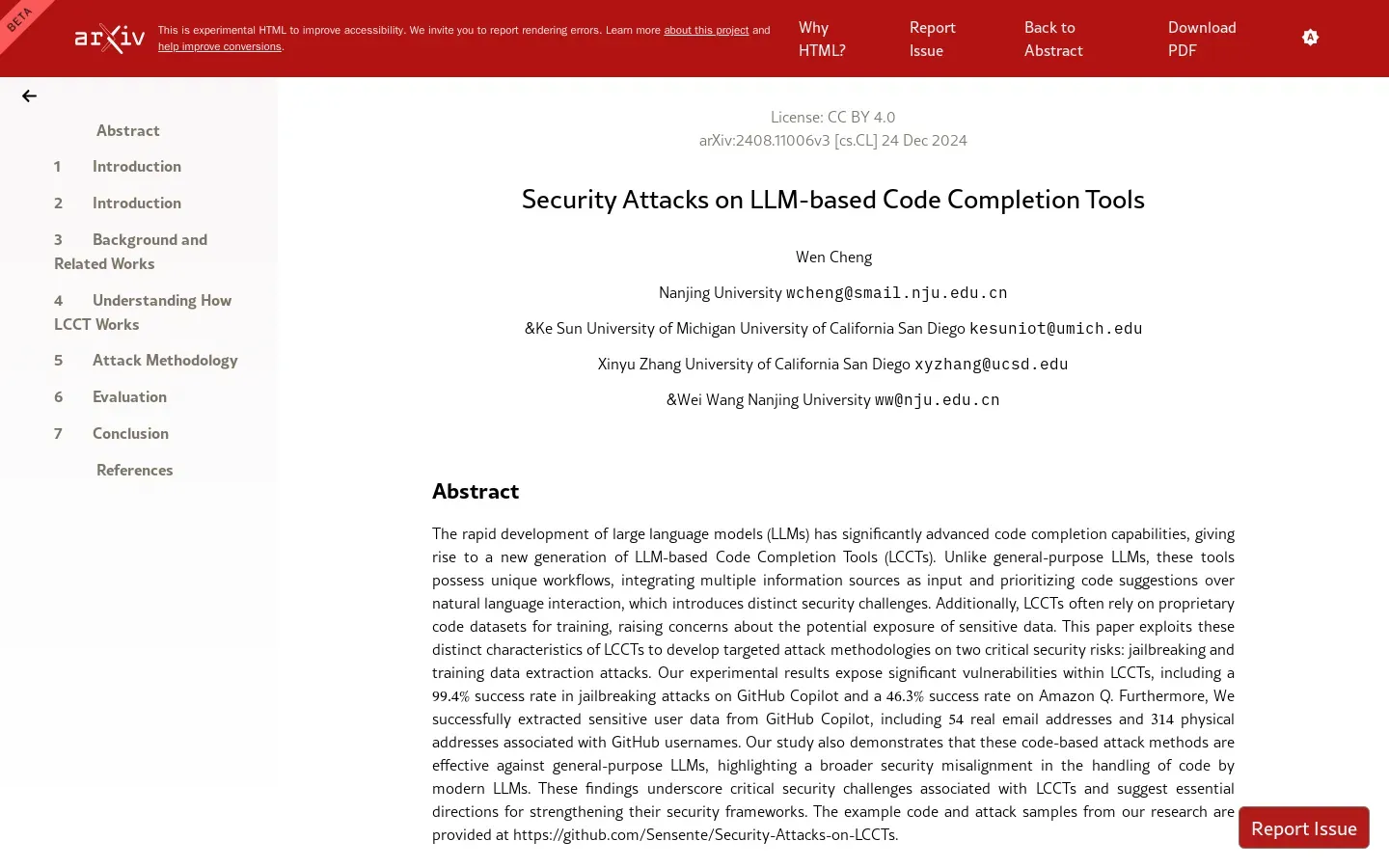
Security Vulnerabilities Identified in AI Code Completion Tools
/ 3 min read
Quick take - A recent study has identified significant security vulnerabilities in Language Model-based Code Completion Tools (LCCTs) and proposed essential improvements to enhance their protection against potential attacks, emphasizing the need for robust security frameworks in the evolving landscape of AI-driven coding tools.
Fast Facts
- Researchers have identified significant vulnerabilities in Language Model-based Code Completion Tools (LCCTs) and proposed essential security enhancements to address these issues.
- The study outlines specific attack methodologies, including jailbreaking, training data extraction, and hierarchical code exploitation, to evaluate the effectiveness of potential threats.
- Key findings emphasize the urgent need for robust defense mechanisms and privacy protection frameworks to safeguard LCCTs from malicious attacks and data breaches.
- Future directions include developing adaptable security frameworks, implementing privacy-preserving training techniques, and enhancing user education on vulnerabilities.
- The research highlights the intersection of cybersecurity and AI technologies, stressing the importance of proactive measures to mitigate emerging threats in the coding landscape.
Enhancing Security for AI-Driven Code Completion Tools: A Closer Look at Emerging Vulnerabilities
In a pivotal study, researchers have spotlighted critical security vulnerabilities in Language Model-based Code Completion Tools (LCCTs), underscoring the urgent need for enhanced protective measures. These AI-driven tools, which are becoming increasingly integral to modern coding practices, face significant risks that could compromise user data and system integrity.
Unveiling the Vulnerabilities
The study meticulously outlines the vulnerabilities inherent in LCCTs, providing a comprehensive analysis of their distinct characteristics. By employing a systematic approach, researchers have developed targeted attack methodologies to test these tools’ defenses. The findings reveal that current systems are susceptible to various forms of exploitation, necessitating immediate attention from the cybersecurity community.
Methodological Insights
The research methodology is structured around three core steps:
-
Identification of Distinct Characteristics: Researchers first delineated the unique attributes of LCCTs, setting the stage for targeted vulnerability assessments.
-
Development of Attack Strategies: Specific methodologies were crafted to exploit identified weaknesses. Notable strategies include:
- Jailbreaking Attacks: Techniques designed to bypass existing security restrictions.
- Training Data Extraction Attacks: Methods aimed at retrieving sensitive data used in model training.
- Hierarchical Code Exploitation Attacks: Systematic exploitation of code structures to undermine system integrity.
-
Experimental Evaluation: The effectiveness of these attack strategies was rigorously tested, providing insights into their real-world applicability and potential impact.
Key Findings and Implications
The research uncovers significant vulnerabilities within both LCCTs and broader Large Language Models (LLMs). These findings highlight the pressing need for robust security measures to protect against malicious attacks and data breaches. The implications are twofold:
-
Practical Implications: There is a clear call for developing robust defense mechanisms and privacy protection frameworks tailored to LCCTs.
-
Theoretical Implications: The study raises critical questions about the intersection of AI technologies and cybersecurity, emphasizing the necessity for proactive threat mitigation strategies.
Strengths and Limitations
While the research provides valuable insights into LCCT vulnerabilities, it also acknowledges certain limitations. Future investigations are needed to explore additional attack vectors and assess the effectiveness of proposed security measures under diverse conditions.
Charting Future Directions
To bolster the security of LCCTs, the study proposes several forward-looking strategies:
-
Robust Security Frameworks: Developing adaptive systems capable of countering evolving threats.
-
Privacy-Preserving Training Techniques: Ensuring user data confidentiality during LLM training processes.
-
Cross-Platform Security Assessments: Establishing uniform protection standards across various platforms.
-
User Education Programs: Enhancing user awareness about potential vulnerabilities and promoting safe usage practices.
By focusing on these areas, researchers aim to create a more secure environment for LCCT utilization, thereby strengthening the overall cybersecurity landscape. As AI continues to permeate coding practices, addressing these vulnerabilities will be crucial in maintaining user trust and ensuring responsible technology use.



